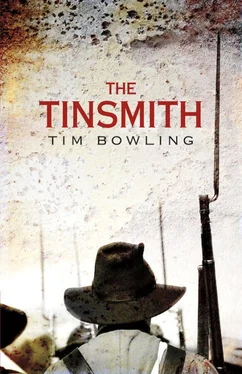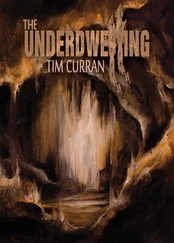Dead Rebels? Gardner suddenly remembered. When he stepped out from the cloth and saw that Gibson had not left the wagon with a fresh plate, he looked to the south where he had hidden his “treasure.” Human crows wandered everywhere, picking at corpses for one reason or another. Some negro gravediggers chanted low, in an unmelodic rhythm; above the sound, Gardner could hear each spade thrust in the earth. Where exactly was that line of dead Rebels?
Then the photographer saw a soldier bent over the bodies. Though Gardner stood fifty yards away, the soldier seemed closer; he was wrapped in the bright sunshine, carved by it into prominence, like the image on a print. And he was dragging a body out of the line!
Gardner took two quick steps forward as a shout formed and then died on his lips. Behind him, he heard the tarp draw back. A fresh plate! Now, of all times. Gardner looked at the camera, at the two Rebels posed fraternally on the gutted earth. Suddenly the awful reek of death washed over him, as powerful as the collodion on the plate. He swallowed deeply and almost staggered against Gibson as he rushed up.
“What is it, Alex? You canna be woozy like I am, man. It’s a regular ether bath in that wagon. I almost passed out on this one.”
“He’s taking the corpse!” Gardner pointed, his mouth open.
Gibson put a hand over his eyes, as if he couldn’t look at the world anymore except through some kind of lens. He shrugged.
“What of it? You’ll never get Brady to print that one anyway. He probably won’t even print the dead Federals.”
“Brady? He’s no ee the only one who can make and sell prints. You might be willing to work for him all your born days, but I dinna come to this country to be taken for a fool. What’s the point of following the army if you’re just going to let Brady make all the money off your talents? Wake up, Jim. We’ve got enough here to make a start on our own. Whatever Brady won’t print and sell, all the better for us!”
Gibson handed Gardner the plate. “All right, captain,” he said, referring to the honorary stripes Gardner’s friendship with McClellan had earned him. “But you’d better hurry with this one before it dries.”
At that moment Gardner knew James Gibson was with him and his fortune was made. It had taken only the saying of it.
Gardner dove back under the cloth. The world flipped upside down again. When he later returned to the light and started counting out the exposure, he could see, across the bereaved and scavenging, across the dead and wounded, the tall, long-limbed soldier carrying a body on his back toward the woods. By the time Gardner had whispered fifteen, the soldier had vanished into the trees.
• • •
The stench worsened as the sun climbed. The droning of flies made a steady, sombre chorus over the fields, but it was loudest inside the enclosed space of the wagon, which sat in the heat-crinkled air like a block of black ice that melted without getting smaller. Gibson complained mightily.
“I canna keep the sweat from dripping off my forehead onto the plate. And when I can manage that, the damned flies get crawling all over it. You’re just lucky, Alex, I can bring you anything worth using.”
He liked to exaggerate, did Jim Gibson, but Gardner knew too well the delicate and frustrating problems he faced. So Gardner offered to sensitize a plate while he let his assistant take a study of some colonel’s dead horse. Gardner soon regretted his generosity. Being inside that wagon was like being on the surface of the sun itself. He’d never known such breath-smothering heat. Sweat gushed out of every pore of his body, and he’d have almost preferred the stench of the festering flesh outside than the giddying fumes of the collodion. If the fumes weren’t bad enough in themselves, they attracted so many flies it was nigh to impossible keeping them off the plates. Gardner’s respect for Gibson grew immensely as he struggled to keep his dripping head away from the plate while savagely shooing flies away with his hands. Had they reversed roles for the day, Gardner doubted they’d have managed even half of the studies that they eventually made. Of course, he wasn’t about to let Gibson know that. Fortunately, when he pushed past the tarp with the plate and walked dizzily to the camera, Gardner found his assistant in even worse shape. He had one hand over his nose and the other on a flask of whisky pressed to his lips. When he’d done drinking, he gave Gardner a ghastly, white look and said, “If it’s all the same to you, Alex, I’d prefer the wagon. I dinna know how ye can stand it. It’s like swallowing great gobs of pus out here.”
By the time the two photographers reached the slaughter along the pike road near the whitewashed little church with the thatched roof, they had their system worked out. Soon enough they didn’t even talk anymore. The light poured over the bloated corpses and smashed limbers, and the white church shone like a gull’s wing against the black woods. A bonny day for photography. But Gardner knew he’d be a cold and heartless man if he hadn’t paused amid all that carnage and considered the truth of what lay before him: brave men had died horribly, boys from modest backgrounds mostly, farm boys and fishermen and workers on both sides, dying for their beliefs while Brady’s fine friends nibbled on squab and made grand noises about sending the Rebels back to Richmond. Gardner almost hated himself then for his excitement—nay, his joy—under the cloth. And yet, he thought about what his images might mean to a public far removed from the war’s reality, and that spurred him on. Mostly he didn’t even have to embellish; the dead were affecting enough, even if, as the day wore on, only Rebels and horses remained on the field. The burial parties worked quickly. Often Gardner had to ask them to take a break while he made his exposures, for any movement would blur the image. They obliged, no doubt out of curiosity at the photographer’s presence, but not for long. Gardner couldn’t blame them. It wasn’t a ground well suited for lingering.
Gardner did not think of his stolen corpse again until later in the afternoon, when, recrossing the battleground of their first studies, which still resembled a massive broken tabletop left uncleared after some giant’s hideous orgy of feasting, he and Gibson stopped once more at the fenced barnyard surrounded by greasy tents for some fortification. Little had changed. The surgeons still cut into bodies, the wounded lay about in solid piles of moaning agony, the graveyard with the plank headboards had grown just outside the fence beyond the cooks’ tent. A few women, looking strange in their feminine apparel, placed cold cloths on foreheads, dispensed water and food, and generally comforted as best they could. Their courage and sense of duty so moved Gardner that the raspy voice at his ear startled like gunshot.
“Have you just come from out there?”
Gardner turned and recognized the bearded surgeon he had observed on his earlier visit. If the man had looked ravaged then, he seemed little more than nerve endings now. The torn sackcloth of his face, the eyes swimming in blood, the forearms so gore-caked that he might have just dipped them in a vat of guts: Gardner could hardly believe the surgeon possessed the strength to speak. He pointed weakly toward the battleground. Gardner nodded, half afraid the wake of air from his small gesture would knock the surgeon down.
“The tall soldier. The one who was helping me. You didn’t see him?”
The urgency in the man’s voice alarmed Gardner. He could hardly tell what answer the surgeon hoped for, but Gardner gave him the truth.
“I did. At least I believe so. I was some distance away.”
The surgeon grimaced and clutched his stomach. “Excuse me, sir. One moment.” He opened a small bottle, shook a pill into his hand, and quickly swallowed it. “What did you see exactly?”
Читать дальше












